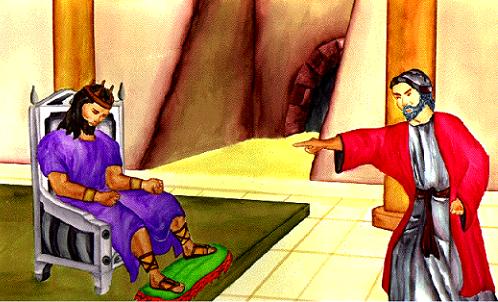One of the figures accompanying King David is Nathan the prophet. The scriptures do not tell much about the work of this prophet and from the little that is told it can be seen that this is a person with different characteristics from those of the other prophets.

One of the figures accompanying King David is Nathan the prophet. The scriptures do not tell much about the work of this prophet and from the little that is told it can be seen that this is a person with different characteristics from those of the other prophets. This is not an angry prophet who fulfills the role of proving at the gate. He does not talk about social injustices, political and international events and apocalyptic visions. It may be due to the fact that the ruling system in his days was stable and that in society as a whole and in the ruling elite in particular, corruption was minor and not as it was with the collapse of the kingdom after Solomon's death. The only case in which Natan's rebuke is heard is the death of Uriah the Hittite. King David desired his wife Bathsheba and sent him to the battlefield in the hope that he would be killed, which indeed happened, and he David would be able to marry his wife. Nathan came to David and rebuked him for this (1 Samuel 15:XNUMX-XNUMX). It is possible that those minor corruptions that did exist (and there is no governmental system that does not contain corruptions) Nathan did refer to, but the prophet's words were lost or the writers of the times did not find it appropriate to insert them into the biblical text.
The only events in which the activity of Nathan the prophet is mentioned are three. The first event is David's desire to build the temple, but Nathan prevented him from doing so, promising that this goal would be carried out by his son (2 Samuel 15:24-25). The second event is the birth of Solomon, in which the prophet gave him another name, Yididia (13 Samuel 25:XNUMX-XNUMX). The third event occurred when Adoniya Ben Hagit tried to seize power. Natan the prophet did not hesitate, intervened in what was happening and with great wisdom instructed Bathsheba how to bring to David's attention what her master had done. David, following this, ordered Solomon to reign in his own lifetime, and this was indeed done. Nathan was involved in every phase of Solomon's reign. In doing so, he dropped the political ground from under his master's feet. He prevented his lordship from gaining power and legitimacy ahead of time. Those who supported his lordship withdrew their support from him and went their separate ways. Adonijah tried to assure himself that no harm would come to him, but he was unsuccessful (XNUMX Kings XNUMX:XNUMX-XNUMX).
It seems that Nathan the prophet was the right hand of King David and his son Solomon and had many moves within the internal politics of the royal court. The scripture says that he wrote down the work of David and Solomon and it is likely that for the purpose of documenting these biographies he kept a private archive in his home which included reports on all the activities in the royal house, in the country and on the international activities of David and Solomon. His access to these materials was easy since he was basically a man of the establishment. He received his salary from the royal house and lived a comfortable life. He may have been a wealthy man.
In 4 Samuel 5:30-40 it is stated that David became king when he was 20 years old and that he reigned for 70 years. In chapter XNUMX it is told about the words of Nathan the prophet that David will not build the temple. It is hard to believe that Nathan had access to David as a teenager, even if the spirit of prophecy was upon him already at that age. He had to be a mature man over XNUMX. These words of Nathan come in terms of the narrative sequence shortly after David's queen. This was also done a few years after David's reign and considering that he was also active in the days of Solomon, it seems that he won longevity. He was XNUMX or older when he died.
More of the topic in Hayadan:
